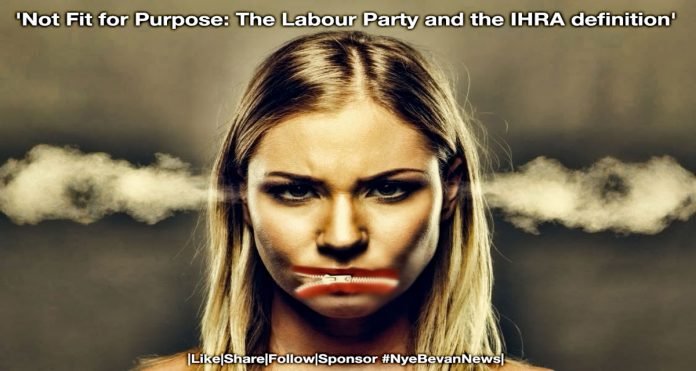On 4th September 2018 the Labour Party NEC agreed to adopt the full working definition of Anti-Semitism used by the committee on Antisemitism and Holocaust Denial as a central policy of the IHRA (International Holocaust Remembrance Association). First introduced at their 2015 Budapest Conference it has since been adopted by six of the 31 countries who are members of the IHRA but it’s still not clear whether they adopted the examples or not.
At present, the existing Labour Party code of conduct is still valid and governs whether the application of an additional series of ‘illustrative examples’ should be applied when considering cases of anti-Semitism, that is, until any new definitions are agreed. However, while a vote is likely to take place on the issue at Conference this month there is also likelihood that any vote on the definition would well be shelved.
Indeed, on closer public scrutiny the document appears deeply flawed
The IHRA adopts the following working definition
“Antisemitism is a certain perception of Jews, which may be expressed as hatred toward Jews. Rhetorical and physical manifestations of Antisemitism are directed toward Jewish or non-Jewish individuals and/or their property, toward Jewish community institutions and religious facilities.”
While it also states criticism of Israel similar to that levelled against any other country cannot be regarded as Antisemitic, there have given eleven illustrative examples of this form of cultural racism in practice as a guide which have been adopted by eight countries and proven highly confusing and controversial:
- Calling for, aiding, or justifying the killing or harming of Jews in the name of a radical ideology or an extremist view of religion.
- Making mendacious, dehumanizing, demonizing, or stereotypical allegations about Jews as such or the power of Jews as collective — such as, especially but not exclusively, the myth about a world Jewish conspiracy or of Jews controlling the media, economy, government or other societal institutions.
- Accusing Jews as a people of being responsible for real or imagined wrongdoing committed by a single Jewish person or group, or even for acts committed by non-Jews.
- Denying the fact, scope, mechanisms (e.g. gas chambers) or intentionality of the genocide of the Jewish people at the hands of National Socialist Germany and its supporters and accomplices during World War II (the Holocaust).
- Accusing the Jews as a people, or Israel as a state, of inventing or exaggerating the Holocaust.
- Accusing Jewish citizens of being more loyal to Israel, or to the alleged priorities of Jews worldwide, than to the interests of their own nations.
- Denying the Jewish people their right to self-determination, e.g., by claiming that the existence of a State of Israel is a racist endeavour.
- Applying double standards by requiring of it a behaviour not expected or demanded of any other democratic nation.
- Using the symbols and images associated with classic Antisemitism (e.g., claims of Jews killing Jesus or blood libel) to characterize Israel or Israelis.
- Drawing comparisons of contemporary Israeli policy to that of the Nazis.
- Holding Jews collectively responsible for actions of the state of Israel.
This has been supported by the leaders of Unite, the GMB and Jon Lansman, and if voted on and carried will then go forward into the Labour Party Rule Book for 2019. Momentum members themselves are now deciding whether or not to adopt the full working definition.
Many have argued that full adoption as a form of anti-racism is self-defeating and that it prevents entirely legitimate criticism against Israel for their historical oppressive treatment of the Palestinian people and their right to full statehood which is now recognised by UN Assembly Resolution 3236 (1974) and 137 of the 193 member states of the United Nations.
It can be argued that the full definition poses a danger to the Fundamental Right to the Freedom of Expression enshrined in The Universal Declaration of Human Rights (1948). The Macpherson and Chakrabarti Reports also make clear that this principle does not protect the expression of racist views or “hate speech”. However, it also states the expression of contentious views on Israel will not be treated as anti-Semitic unless accompanied by specific anti-Semitic content (tropes, stereotypes etc).
In short, there is a huge contradiction at the heart of this definition, as the Labour Party has adopted no other definitions of cultural racism adopt related to other ethnic or religious groups. For instance, the Runnymede Trust’s definition of Islamophobia (1997) has not been adopted by the Party as part of its code of conduct.
Dr Ash Sakar who specialises in political theory and race in fact made the point this week that affording one particular religion special status creates a hierarchy of racism, in which one minority group is deemed worthy of protection and others are not. Geoffrey Robertson has also concluded that it is not fit for purpose: ‘It is imprecise, confusing and open to misinterpretation and even manipulation’. The definition would appear corrosive to the politics of social solidarity and the shared struggle against racism in all its forms:
‘This is where we must think very seriously about what the work of anti-racism is. Antisemitism, at this point in history is primarily experienced as prejudice and hostility towards Jews as Jews, largely without aspects of material dispossession (such as structural unemployment) that manifest in other forms of racism’ (Sakar 2018).
There is also the problem that the eleven illustrative examples above are so vaguely defined that they are invested with massive power that can easily be misused when it comes to how the code will be applied in disciplinary and data-gathering contexts. Judge Stephen Sedley argues the effect of the definition’s gaps “whether or not it is their purpose, is to permit perceptions of Jews which fall short of expressions of racial hostility to be stigmatised as Antisemitic”.
This is particularly the case when seven out of the eleven examples above are about how people criticise the state of Israel. Thus, a definition of racism that ought to help us open up a conversation about protecting marginalised groups is primarily concerned with closing down what we can say about Israel’s role in a geopolitical conflict. There are already many examples of this being used to close criticism of Israeli policies in wider society.
Palestinian trade unions and other allies have argued that “this non-legally binding definition attempts to erase Palestinian history, demonise solidarity with the Palestinian struggle for freedom, justice and equality, suppress freedom of expression, and shield Israel’s far-right regime of occupation, settler-colonialism and apartheid from effective measures of accountability in accordance to international law”
The uncertainty regarding IHRA’s interpretation presents a potential threat to Labour members’ freedom of expression regarding solidarity with the Palestinian people, in line with international UN law. This potentially undermines what may be legitimate criticism of the state of Israel in their treatment of the Palestinians for what can be deemed purely political purposes by Corbyn’s enemies.
Yet again, this can be seen as another attempt to place Jeremy Corbyn in an untenable position that undermines his leadership as well as undermining longstanding support for their struggles to gain full statehood in medium to long term. Members all over the country who are considering this decision would do well to distance themselves from the definition and the actions of the outgoing NEC members who agreed to its adoption.
Reference Links:
https://www.doughtystreet.co.uk/news/article/ihra-definition-of-antisemitism-is-not-fit-for-purpose
https://www.runnymedetrust.org/projects-and-publications/equality-and-integration/islamophobia.html
https://www.theguardian.com/commentisfree/2018/sep/03/ihra-antisemitism-labour-palestine
Opinion piece. By Dr Keith Hussein
This is a "Pay as You Feel" website Please help keep us Ad Free.
You can have access to all of our online work for free. However if you want to support what we do, you could make a small donation to help us keep writing. The choice is entirely yours.























